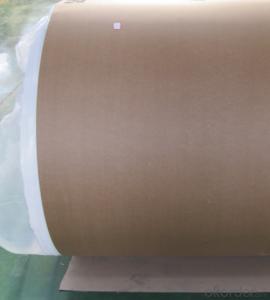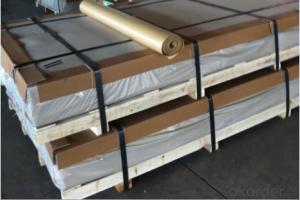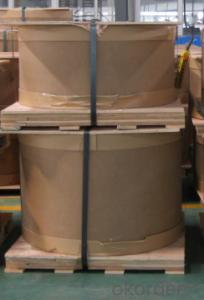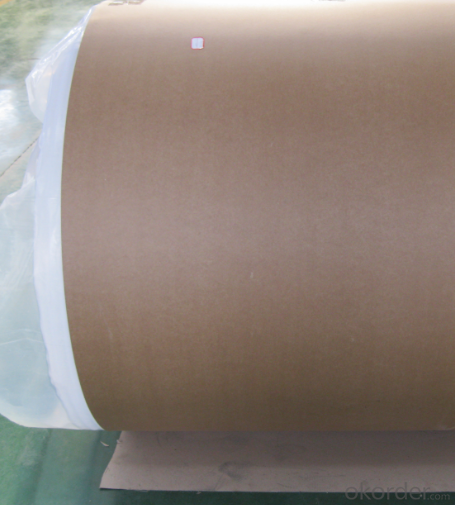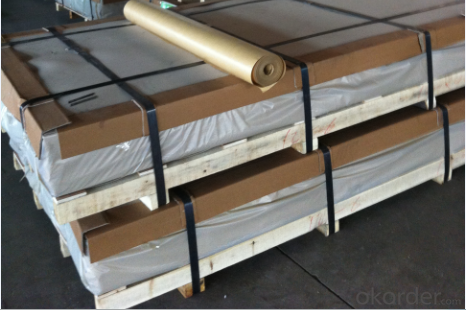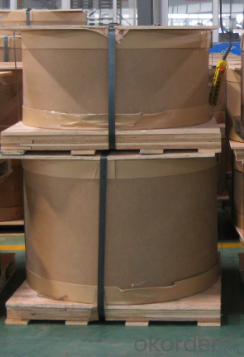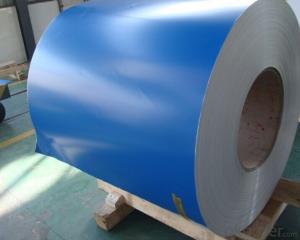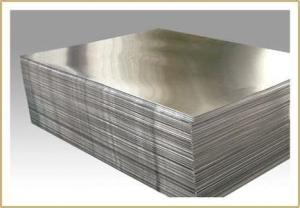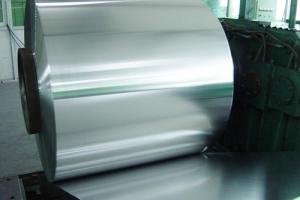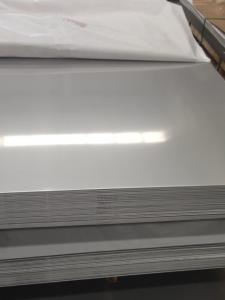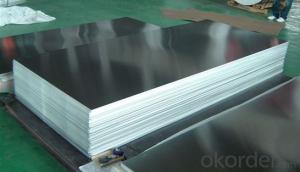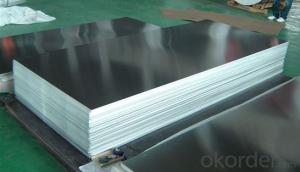Dye Sub Aluminum Sheets - Aluminium Slabs and Cold Rolled Alloy Aluminium Plates
- Loading Port:
- Shanghai
- Payment Terms:
- TT OR LC
- Min Order Qty:
- 9 m.t.
- Supply Capability:
- 6000 m.t./month
OKorder Service Pledge
OKorder Financial Service
You Might Also Like
1.Structure of Product Description
hot rolled aluminum coil, cold rolled aluminum sheet, cold drawn aluminum sheet, hot rolled aluminum sheet, are all widely used in the field of decoration field, etc. 1100-H14, 1050-H16, 1060-H18 are the best-selling grades, etc.
2. Main features of the product
a. Competitive price
b. Frist-Class Service.
c. Shortest service.
3. Image.
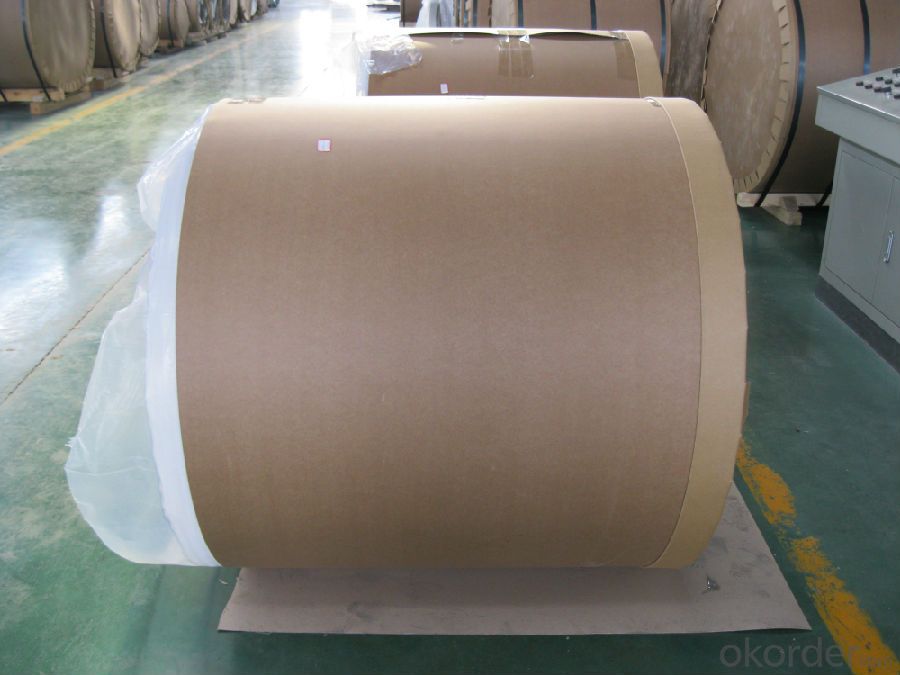
4. Product detailed sizes:
1000mm*2000mm, 1219mm*2438mm,1220mm*2440mm, 1250mm*2500mm,1500mm*3000mm, etc.
5. FAQ:
What is the quality standard?
---Usually our standard is GB3880-2006 or others.
What is the length range:
---It is from 2000mm to 6000mm, etc..
Where is your client from?
---Normally it is from Japan, USA, ENGLISH, SINGAPORE, ETC.
What is your mainly products?
---Normally they are aluminum sheet, checkered sheet, mirror finish aluminium sheet, aluminum casting coil, etc.
- Q: Can anyone tell me what to be careful of if you have aluminum wiring in your house. I was told that if the wall gets hot, I need to tighten the screws of the inside switch. Is this true and if I didn't, would it actually cause a fire in the wall. If this is true, how often does it loosen?
- For an immediate fix ,all switches and outlets should be checked to make sure the screws are tight. With aluminum small gauge wire #12 and #10 the screws will continue to loosen up over time because of the nature of aluminum( expanding and contracting). Repairs in the past have been pig tailing copper tails with approved wire nuts or using special switches and receptacles. It is my understanding that the Copalum crimp method is the best solution for aluminum wiring on switches and outlets. Check out information about this method on the net and seriously consider hiring and electrician that knows how to do this crimp method. Some electricians use the purple wirenut to pigtail copper but there have been problems with this method not working. Loose connections with aluminum wire is a serious fire hazard. Good luck.
- Q: Are the aluminum sheets suitable for welding?
- Aluminum sheets can indeed be welded. Welding aluminum is a popular choice because of its lightweight nature, high strength-to-weight ratio, and resistance to corrosion. Nevertheless, it is crucial to acknowledge that welding aluminum necessitates specific techniques and considerations that differ from those used with other metals. Aluminum possesses a lower melting point and higher thermal conductivity, making it more challenging to weld when compared to steel or other metals. For this reason, specialized welding processes like Tungsten Inert Gas (TIG) welding or Metal Inert Gas (MIG) welding with a spool gun are frequently employed for aluminum welding. Moreover, proper cleaning and preparation of the aluminum surface, along with the utilization of appropriate filler materials, are essential for achieving strong and enduring welds. In conclusion, by utilizing the appropriate equipment, techniques, and expertise, it is possible to successfully weld aluminum sheets and create various structures and components.
- Q: A construction worker uses a steel tape to measure the length of an aluminum support column. If the measured length is 17.7 m when the temperature is 21.2°C, what is the measured length when the temperature rises to 35.4°C? (Note: Do not neglect the expansion of the steel tape. Give your answer to three decimal places.)I am really confused... Could someone solve it for me with a step-by-step explanation? Thank you so much.
- Assume linear thermal expansion with constant expansion coefficient. The change of length is given by: ΔL = L?·α·ΔT (L? initial length, α linear thermal expansion coefficient) The overall length of an object as function of temperature is: L= L? + ΔL = (1 + α·ΔT) · L? Consider the measurement at 21.2°C as reference: The aluminum column changes its length to L= (1 + α_aluminum · ΔT) · L? = (1 + 23×10-6 ^C°-1 · (35.4°C - 21.2°C) ) · 17.7m = 17.705m That would be the length measured with a steel tape at reference temperature of 21.2°C. Unfortunately the steel tape expands too. Because the scale increases with the expansion it measures too short. On the expanded tape you read the length L? while the actual length is L. Hence the measured length is: L? = L / (1 + α_steel · ΔT) = 17.705m / (1 + 11×10-6 ^C°-1 · (35.4°C - 21.2°C) ) = 17.003m
- Q: Which kind of glue is best for bonding aluminum sheets?
- I advice you to use AB glue to bond aluminum sheets, acylic acid AB glue is better than 502 in bonding aluminum sheets, Gelianghao XSSS-290AB glue sold in hardware store can directly permeate into the surface of aluminum sheets and bond the sheets tightly.
- Q: What are the common applications of aluminum sheets?
- Aluminum sheets have numerous common applications across various industries. One of the most prevalent uses of aluminum sheets is in the construction industry. They are often used for roofing, siding, and facades due to their lightweight nature, corrosion resistance, and durability. Aluminum sheets are also commonly used in the transportation industry, particularly for the manufacturing of vehicles and aircraft. Their high strength-to-weight ratio makes them ideal for constructing car bodies, truck beds, and airplane parts. Additionally, aluminum sheets find applications in the packaging industry, where they are used for making cans, foils, and closures. The excellent thermal and electrical conductivity of aluminum also makes it a popular choice for heat sinks, electrical enclosures, and electronic components. Furthermore, aluminum sheets are utilized in the marine industry for boat building and in the manufacturing of appliances, such as refrigerators and cookware. Overall, the versatility and advantageous properties of aluminum sheets make them indispensable in various sectors.
- Q: Can aluminum sheet be used for signage?
- Yes, aluminum sheet can be used for signage. Aluminum is a popular choice for signage due to its durability, versatility, and cost-effectiveness. It is a lightweight material that is resistant to corrosion, making it suitable for both indoor and outdoor signage. Aluminum sheet can be easily cut, shaped, and formed into various sizes and designs, allowing for customizable signage options. Additionally, aluminum can be easily printed or engraved upon, making it ideal for displaying text, graphics, and logos. Its sleek and professional appearance adds to its appeal for signage purposes. Overall, aluminum sheet is an excellent choice for signage due to its durability, versatility, and aesthetic qualities.
- Q: What is the weight of aluminum sheets per square foot?
- The weight per square foot of aluminum sheets may differ depending on the sheet's thickness or gauge. Typically, a 1/8 inch thick aluminum sheet weighs approximately 1.9 pounds per square foot. Nevertheless, thinner sheets tend to be lighter, whereas thicker sheets can be heavier. It is crucial to take into account the precise thickness of the aluminum sheet when calculating its weight per square foot.
- Q: What are the different types of finishes available for painted aluminum sheets?
- There are several different types of finishes available for painted aluminum sheets, each offering unique characteristics and benefits. 1. Matte Finish: This finish provides a non-reflective, dull appearance to the painted aluminum sheet. It is commonly used in applications where a low-gloss finish is desired, such as architectural elements or interior design. 2. Gloss Finish: A gloss finish gives the painted aluminum sheet a shiny, reflective surface. It is often chosen for applications where a sleek and polished appearance is desired, such as automotive parts or decorative panels. 3. Textured Finish: A textured finish adds a raised pattern or texture to the surface of the painted aluminum sheet. This type of finish is commonly used for decorative purposes, as it can enhance the visual appeal and provide a unique tactile experience. 4. Metallic Finish: A metallic finish gives the painted aluminum sheet a metallic appearance, resembling the look of metal alloys like stainless steel or bronze. This finish is frequently used in architectural applications to achieve a modern and high-end aesthetic. 5. Powder Coating Finish: Powder coating is a popular finishing method that involves applying a dry powder to the surface of the painted aluminum sheet and then curing it under heat. This process creates a durable and seamless finish that is resistant to chipping, scratching, and fading. 6. Clear Coat Finish: A clear coat finish is often applied over a painted aluminum sheet to provide an extra layer of protection and enhance its durability. This finish is typically transparent and helps to resist damage from UV rays, moisture, and other environmental factors. It is important to consider the intended use and desired aesthetic when choosing a finish for painted aluminum sheets, as each type offers its own unique benefits and characteristics.
- Q: Are the aluminum sheets suitable for manufacturing chemical storage cabinets?
- Yes, aluminum sheets are suitable for manufacturing chemical storage cabinets. Aluminum is highly resistant to corrosion, lightweight, and has good thermal conductivity, making it an ideal choice for storing chemicals safely. Additionally, aluminum is non-reactive with most chemicals, ensuring the integrity of the storage cabinets.
- Q: Can aluminum sheets be bent?
- Indeed, the bending of aluminum sheets is possible. Aluminum, being a remarkably pliable metal, can be effortlessly manipulated and molded through methods like bending, rolling, or folding. To achieve a particular angle or curve, the procedure for bending aluminum sheets entails the application of force onto the metal. This can be accomplished using specialized equipment like a brake press or through manual techniques. The adaptability of aluminum renders it a favored option for a variety of applications in the construction, automotive, and aerospace sectors, where bending or shaping is necessary.
Send your message to us
Dye Sub Aluminum Sheets - Aluminium Slabs and Cold Rolled Alloy Aluminium Plates
- Loading Port:
- Shanghai
- Payment Terms:
- TT OR LC
- Min Order Qty:
- 9 m.t.
- Supply Capability:
- 6000 m.t./month
OKorder Service Pledge
OKorder Financial Service
Similar products
Hot products
Hot Searches
Related keywords
